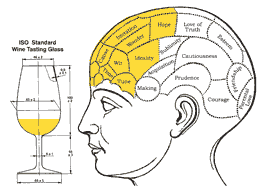 Two favorite wine writers recently teased at the distinction between sensual wine discovery and accumulated wine knowledge. Their words fanned a flame first kindled by my earliest wine crush back in the mid eighties. Not the press and juice kind of crush. I mean the ten-year-old-kiddie-kind-of-crush; when just the thought of that special “someone” lightens heads, warms chests, shortens breaths, stirs loins, and releases imaginations in delightful ways that never seemed plausible before. This style of sensual and intellectual pleasure requires absolutely no training yet is recognizable by anyone. So guess what? Connecting with wine at the intensity levels of a 4th grade schoolyard crush requires as little training and knowledge.
Two favorite wine writers recently teased at the distinction between sensual wine discovery and accumulated wine knowledge. Their words fanned a flame first kindled by my earliest wine crush back in the mid eighties. Not the press and juice kind of crush. I mean the ten-year-old-kiddie-kind-of-crush; when just the thought of that special “someone” lightens heads, warms chests, shortens breaths, stirs loins, and releases imaginations in delightful ways that never seemed plausible before. This style of sensual and intellectual pleasure requires absolutely no training yet is recognizable by anyone. So guess what? Connecting with wine at the intensity levels of a 4th grade schoolyard crush requires as little training and knowledge.
Wine Knowledge
How is it that knowledge is not a prerequisite to understanding wine? Organizing and participating in decades of regular, blind, peer group tastings makes it obvious to me that delicious wine can be picked out of blind lineups by beginner and expert wine tasters alike. Inexperienced palates are perfectly capable of discriminating between wines of the same grape, region, and vintage if they are poured side by side. New wine tasters are at ease identifying favorite and least favorite wines using unformed personal language to describe sensory detection to themselves, but are intimidated to verbalize their descriptions to others with more wine knowledge. Actually, their preferences are as interesting as any other taster’s choice; pure and unaffected by the presumptions of technical wine knowledge. Their interpretations are unadorned with catch phrases and buzzwords used, as required, by tasters with deeper wine education and knowledge.
Committing time and energy to advanced wine education almost always relies on a sequence of loving wine before knowing wine. All the knowledge filling studious winos’ ammunition bunkers only comes after being smitten by a crush on wine. And, the raw sensory and intellectual stimulus telling someone to prefer one wine over another is not something you learn in continuing wine education programs.
An excerpt from “The Taste of Wine: The Art and Science of Wine Appreciation” by Peynaud and Blouin further illustrates this point:
The transmission of a stimulus to the senses via our nervous system, and the response that our brain relays to our consciousness or motor centers, together create a continuous network of information and interpretation which is the very token of our existence: I sense therefore I am; our consciousness functions precisely because of the host of impressions which surround it. It is also the means by which we understand our environment. We live because of what we see, hear, smell, taste, and touch. Chauchard reminds us of the Latin adage: “What intelligence we have has its source in our senses”
In one of his recent Forbes.com columns, Jeff Lefevre calls it wisdom and differentiates that from wine knowledge by neatly saying, “…placing wine within a bigger context of the human experience making the enjoyment of wine not something that is reliant upon deep knowledge to appreciate, but rather as a beverage that can complement a life well lived.”
Wine Crush
 In a category of its own, “love” has its certain place alongside the many more structured elements defining a life well lived. Similarly, falling in love with wine is as central and separate a proposition to sensory identification and accumulated knowledge in a well lived life of wine. Addressing a group of wine writers this summer, Eric Asimov asserted “you need to own wine and drink bottles“ with meals to discover your love for wine. Simply tasting and educating yourself about it won’t do it.
In a category of its own, “love” has its certain place alongside the many more structured elements defining a life well lived. Similarly, falling in love with wine is as central and separate a proposition to sensory identification and accumulated knowledge in a well lived life of wine. Addressing a group of wine writers this summer, Eric Asimov asserted “you need to own wine and drink bottles“ with meals to discover your love for wine. Simply tasting and educating yourself about it won’t do it.
The bottle of 1985 Lynches Bages that I first tasted in a blind tasting was a completely different wine experience than drinking the same wine with my wife over a relaxed anniversary dinner at Mirabelle, a once (have not been there since 1990, but it still operates) romantic temple of serious french cuisine in St. James, Long Island. The Lynches Bages was more layered, delicate, nuanced, and complex with excellent food and company. The experience also cemented my developing fascination for the ways wine feeds human connection. The links between my love for my dinner partner and crush on the wine naturally weaved themselves into a blanket of sensory delight.
Stephanie Ortigue, assistant professor of psychology and adjunct assistant professor of neurology at Syracuse University, published an important study called “The Neuroimaging of Love,” which touches on the sensory intake that leads to love creation in intellectual areas of the brain and also the heart:
…the complex concept of love is formed by both bottom-up and top-down processes from the brain to the heart and vice versa. For instance, activation in some parts of the brain can generate stimulations to the heart, butterflies in the stomach. Some symptoms we sometimes feel as a manifestation of the heart may sometimes be coming from the brain.
The study establishes that it only takes 1/5th of a second to fall in love when two potential mates establish sensory exchange. Various regions of the brain begin processing past experiences alongside immediate sensory intake to either create butterflies in the stomach or an empty feeling in less than a second. Ortigue asserts her study “…reinforces the fact that love is more than a basic emotion. Love also involves cognition.”
Is this combination of sensory and intellectual processing the same with wine? If it sounds like it is, then isn’t it entirely possible to fall in love with the right wine and have that crush launch a lifetime of wine pursuit in the very same way two loving mates organize a life of personal commitment to one another?
Beauty and Crush
Commitment is serious business and crushes evaporate as fast as they start. As we mature in life it’s easier to see that nuance, character, presence, challenge, and intellectual stimulation are as, if not more, important to a lifetime of love than surface level physical beauty. For this reason, my wine cellar has a certain style of wine that I bought in the 80’s and early 90’s that I won’t buy anymore. Fifteen years into my life of wine enjoyment I found wines what teased my intellect, challenged my palate, and invigorated my food. That style combination stole my mind and heart. And it wasn’t the big, fat, fruit forward, sex bomb style of wine I was previously consumed with. I guess it’s never too late to grow up.
In a recent open letter of advice to “wine newbies”, the Wine Spectator’s Matt Kramer drew a distinction between wines that can provide “life satisfaction” and those that simply offer “pleasure”. In it, he leaned on E. E. Cummings who raised the bar by writing, “Always the beautiful answer who asks a more beautiful question,” suggesting the real trick to discovering a lifetime of wine enjoyment is to find your own “beautiful questions.” Kramer went on to explain that a life of wine satisfaction:
“…depends upon recognizing what you’re really seeking… I was in Napa Valley and was tasting a Cabernet that is, by most estimations, a lovely wine. And it was a lovely wine: dense, fragrant, irresistibly supple and oh-so pleasing. A lot of people like it…Yet I’ve never cared overly for the wine… Here we come to the “beautiful question” part. Whenever you taste a wine that goes beyond the ordinary (dull wines allow only the dullest demands), you’ve got to go beyond the usual techno-talk about tannins or acidity or oakiness. If those are your “more beautiful questions” I promise you that you’ll never really “get into” wine.
So what was my problem with this perfectly fine Napa Cabernet? It had no “edge.” Really good and, especially, great wines, for me anyway, have an “edge.” It’s a certain something that not only fascinates, but challenges. This Napa Cabernet offered no challenge. It only offered—dare I say it?—pleasure.
It’s okay, just like in life, to fall in love with the most beautiful and alluring surface characteristics that produce pleasurable gulps of wine. It proves we don’t require knowledge for wine to produce its visceral swoons of delight and human connection. At some point, though, finding lasting beauty requires, as Matt Kramer suggests, asking the “more beautiful questions” that eventually define lifetimes of intellectual and emotional reward through wine. And from there, the knowledge will easily flow.
